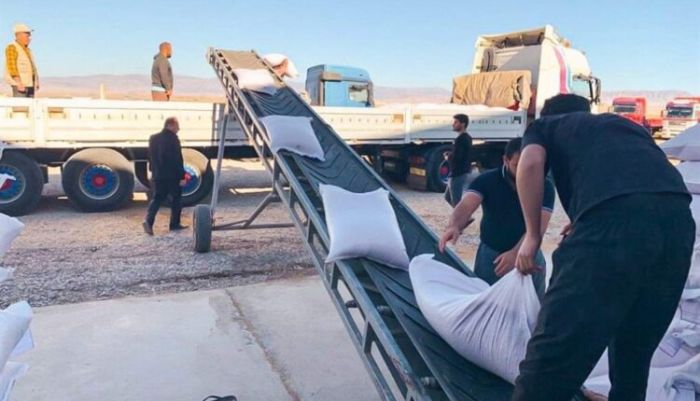At a time when severe sanctions are imposed on Syria, which, among other things, have led to further deterioration of the conditions of Syrian farmers, the United States is taking on the guise of caring for these people. The U.S. has initiated a campaign to distribute wheat seed to them for free, which raises fears of an intention to poison the soil in the east, threatening Syria’s agricultural capabilities
The United States has not only caused the loss of large quantities of wheat in the east of the country by setting fires in 2019 and 2020, whether by throwing thermal balloons or recruiting personnel to carry out the mission. The U.S. is continuing its efforts today to sabotage the wheat production process in Syria.
In this context, and under the pretext of helping Syrian farmers after last year’s drought season, U.S. forces began distributing about 3,000 tons of wheat seed free of charge in the al-Hassakeh governorate. Apparently, this is aimed to win over the population by taking advantage of the scarcity they live in, and the difficulty of delivering high-quality seeds from the Syrian government to them, since they were prevented by the Autonomous Administration from dealing with government agencies.
But beyond that courtship, there appears to be a U.S. attempt to transport soil-damaging agricultural pests to Syrian territory, which threatens to destroy Syria’s agricultural capabilities in the medium and long term, after nearly being self-sufficient for many years.
Read Also: USAID Distributes Suspicious Wheat Seeds in Hassakeh
The United States announced, through the official account of the U.S. Embassy in Damascus that “USAID will distribute nearly 3,000 tons of high-quality wheat seeds to farmers in northeastern Syria, as the wheat planting season begins.”
Local and official sources questioned these intentions, based on earlier accusations by the United States of stealing rare Syrian seed from the International Center for Agricultural Research (ICARDA) in Aleppo, as well as its responsibility for wheat field fires.
The Syrian Ministry of Agriculture responded to the U.S. announcement by warning “farmers not to grow wheat seeds of unknown source (smuggled) for possible infection or transportation of many pests.” The Ministry pointed out that “the General Organization for Seed Multiplication (GOSM) has 70 thousand tons of wheat seeds prepared to implement the agricultural plan for next season. This comes in addition to the presence of 20 thousand tons of reserve, all of which are sufficient to fulfill the needs of the farmers from sifted and sterilized seeds, content specifications, quality and safety from pests.”
The Ministry of Agriculture warned that “the introduction of any quantity of wheat from the U.S. is illegal, and includes risks in terms of variety and type, the possibility of introducing stone pests such as Nematodes -which are widespread in America- and many plant diseases, especially bacterial.”
This article was translated and edited by The Syrian Observer. The Syrian Observer has not verified the content of this story. Responsibility for the information and views set out in this article lies entirely with the author.


